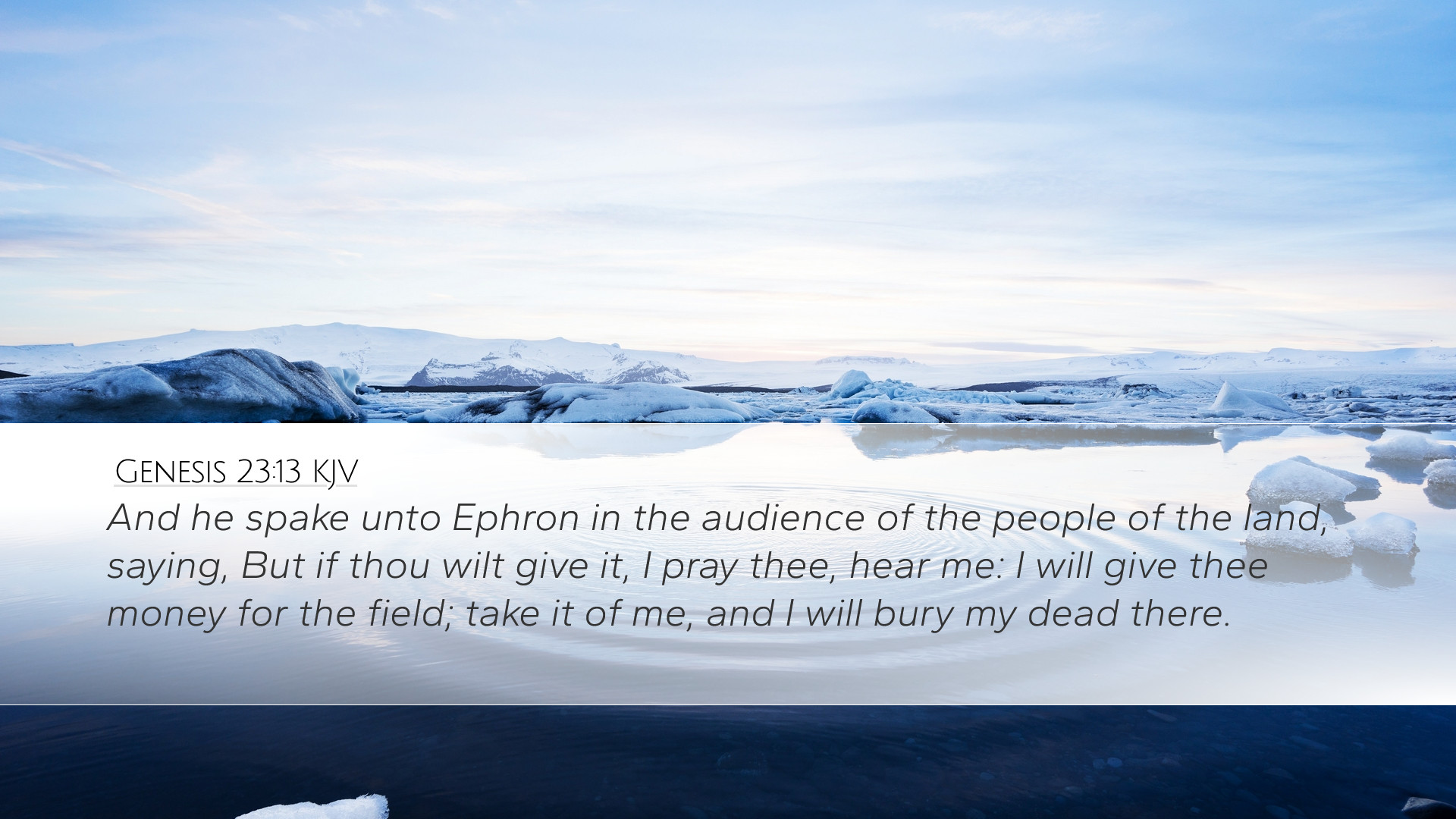Commentary on Genesis 23:13
Text of the Verse: "And he spake unto Ephron in the audience of the people of the land, saying, But if thou wilt give it, I pray thee, hear me: I will give thee money for the field; take it of me, and I will bury my dead there."
Introduction
In this poignant narrative, we witness the deep respect Abraham holds for his deceased wife, Sarah. The intricacies of negotiation revealed here reflect not just cultural practices but also Abraham's character and faith. This commentary seeks to unravel theological insights and practical implications derived from Genesis 23:13 by synthesizing thoughts from esteemed public domain commentators.
Contextual Background
This passage is situated in a crucial phase of Abraham's life. Sarah's death marks a transition from nomadic life to a more settled existence. Having long sojourned in the land of Canaan, Abraham's request for a burial site establishes his emerging claim to the land that God promised him. Matthew Henry, in his commentary, underscores the significance of Abraham's intention to acquire a burial plot; it signifies a future hope and an affirmation of God's promises regarding the land.
Abraham's Negotiation with Ephron
The focus of the verse is on Abraham's respectful and dignified negotiation with Ephron for the purchase of the cave of Machpelah. Albert Barnes emphasizes how Abraham’s approach demonstrates his desire for a lawful possession rather than a mere gift, illustrating integrity and rightful entitlement to the land.
Public Perception and Community Involvement
It is noteworthy that this negotiation occurs "in the audience of the people of the land." Adam Clarke points out that conducting business in public reinforced the legitimacy of the transaction, ensuring that Abraham's intentions were clear to the local community and Hebron's inhabitants. This public acknowledgment served to establish Abraham's status in the land and his connection to the Canaanites.
The Importance of Burial Practices
The request for a burial site is laden with cultural significance. In ancient Near Eastern customs, burial practices were vital for securing a place in the ancestry of one's family. Henry elaborates that Abraham’s insistence on purchasing the land rather than receiving it as a gift demonstrates his faith in God's promise, providing a tangible connection to the land he was yet to fully possess.
Theological Insights
Faith and Ownership
Abraham’s actions reveal a profound faith in God’s covenant. He understood that the acquisition of land was not merely about earthly possession but a step toward the fulfillment of God’s divine promise. Clarke suggests that Abraham teaches us the importance of acting in faith while also taking prudent steps toward the fulfillment of God’s word.
Respect and Dignity in Relationships
In the exchange, it becomes apparent that respect for others is paramount, even in moments of personal grief. Abraham's courteous manner in addressing Ephron demonstrates humility while asserting his rights. Barnes remarks on the character trait of Abraham being exhibited here as one embodying both confidence and respectfulness. Wisdom is seen in blending assertiveness with grace, a lesson that is timeless for leaders and congregants alike.
Lessons on Mourning and Legacy
The burial of Sarah is an essential act of honoring her memory. It suggests the importance of taking time to mourn and to establish a legacy. Henry remarks that where we bury our loved ones often reflects our values and beliefs concerning the afterlife and memory. This moment echoes throughout generations, teaching those who follow the importance of honoring their predecessors.
Practical Applications
As pastors, theologians, and students of the Bible, several practical applications can be derived from Abraham's negotiation with Ephron in Genesis 23:13.
- Moral Integrity: Cultivating integrity in our dealings with others, ensuring that we're wise yet respectful in our interactions.
- Faith in Action: Trusting in God’s promises through active engagement in fulfilling them while being diligent in our responsibilities.
- Community Awareness: Recognizing the importance of community and public perception in our disputes and interactions, echoing the need for transparency and honor in our relationships.
- Legacy Building: Understanding the deeper commitment to the legacy we leave through the respect afforded to the deceased, as well as the significance of where we lay them to rest.
Conclusion
Genesis 23:13 encapsulates profound themes representing faith, integrity, and respect for relationships. It invites readers to reflect on how they engage with their communities, how they honor their loved ones, and how they act within God’s promises. In this narrative, Abraham serves as a model for faithful living, reminding us that our actions today impact the eternal legacy we leave behind.


